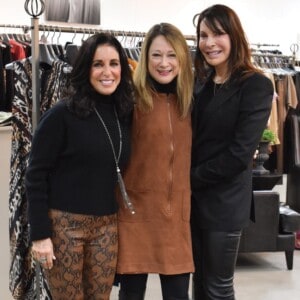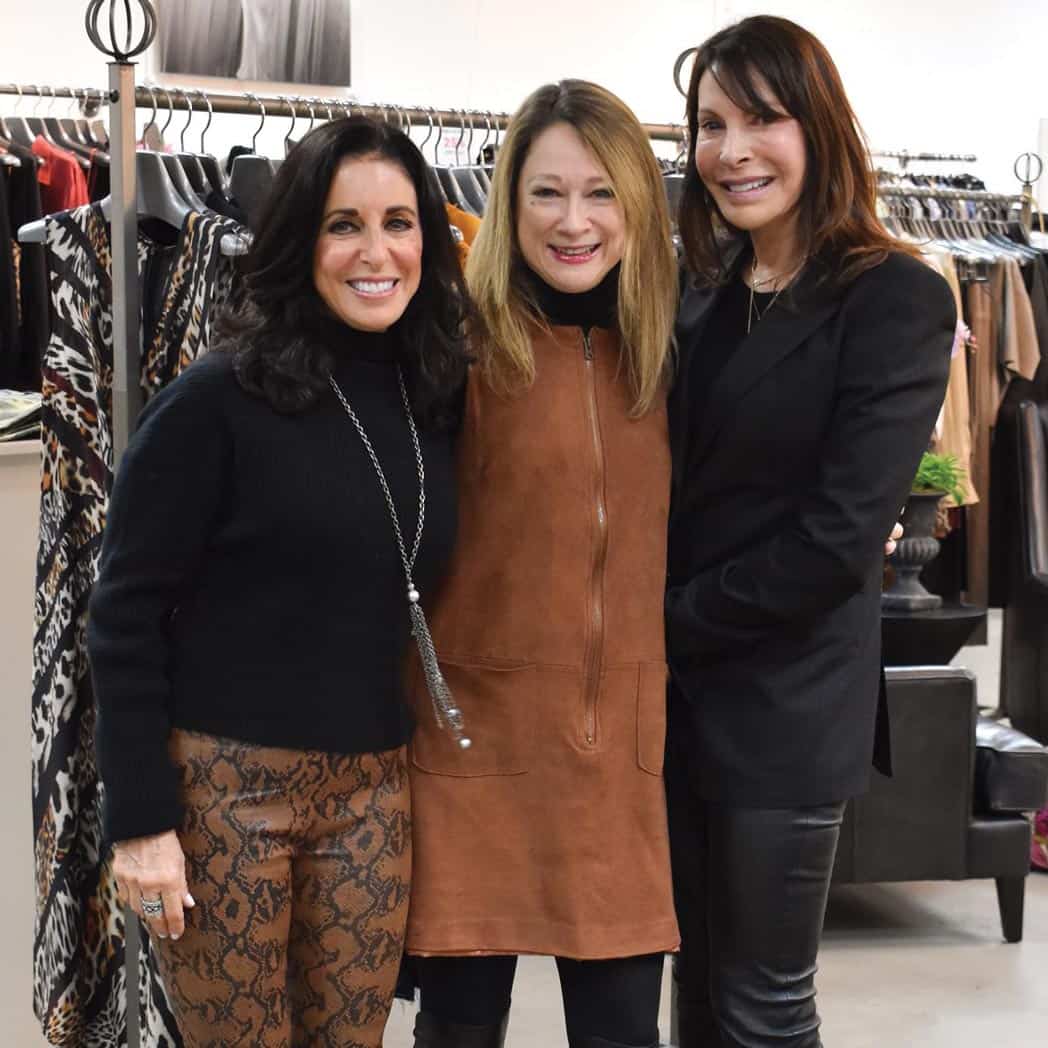
Shari Dozoretz Friedman, Elizabeth Weitzman, and Tricia Snyder. Elizabeth Weitzman signs her book, Renegade Women in Film & TV.
It was the perfect fit. Elizabeth Weitzman, Tricia Snyder, and members of United Jewish Federation of Tidewater’s Society of Professionals got together on a rainy February night, in a trendy boutique backlit with sparkly dresses, puffy winter jackets, iconic illustrations—and girl gusto.
Weitzman is the author of Renegade Women in Film & TV. Her compelling message about the impact of women supporting women resonated with co-host Tricia Snyder, a single mother and fashion force of nature, celebrating more than 30 years in business.
In her brief talk, Weitzman chose illustrations of four ‘firsts’ from her book to paint a picture: Geena Davis. Frances Marion. Alice Guy-Blache and Ava Duvernay. Women are built to mentor and be mentored. “The early female pioneers in film and tv did more than break down barriers,” says Weitzman. “They pulled other women along behind them.”
Snyder’s business journey is tied to relationships she fosters with women. “Elizabeth took the time to personally autograph every book and speak to each woman with a real genuine spirit,” she says. “I’m inspired to help women find their value, their voice, and support their desire to tell a compelling story. I hope women who work and have a passion will jump into the excitement of this movement.”
Real estate professional Ashley Zittrain says she hopes to see more Jewish professional networking programs like this. “It was a successful event, where it was so uplifting to see Jewish women supporting each other and connecting. Everything about it was stunning, from the food catered by women, the guests, the female guest author, to Tricia and her chic boutique exemplifying what it means to lift women up. SOP is not just for our male counterparts and I look forward to playing a part in more events just like this.”
At noon the next day, SOP event co-host Shari Dozoretz Friedman carried forward Weitzman’s message of female empowerment at the community-wide Lee and Bernard Jaffe Family Jewish Book Festival event at the Simon Family JCC. Friedman expressed personal pleasure meeting the guest author and sharing the group’s delight in her gift for igniting a culture of support among women.
In Friedman’s introduction, she noted that Weitzman most recently served as the senior film critic at the New York Daily News where she covered entertainment for 15 years. She is also the author of more than two dozen books for children and young adults. Weitzman is one of only three women on the 2015 list of New York’s Top Film critics, by the Hollywood Reporter.
Petite and soft-spoken but fiery, Elizabeth Weitzman stands tall for women in film and tv. Her singsong voice becomes more emphatic when showing examples of pioneers who were cast aside, proving the bias against women in the industry she knows so well. Her sole mission is to write the real pioneers back into the story. While women like Ida Lupino, Alice Guy Blache, Dorothy Azner, and Helen Gibson were breaking new ground in cinema, the direct beneficiaries of their craftiness used their power as male studio executives and historians to write them out of the very stories they made possible.
“I’m happy to talk about the truly amazing history of women in film because many of us were actually taught from a somewhat limited perspective, in which a few high-profiled women were included, as if though they were the exception to the rule. But in fact, there have always been diverse voices in every field including cinema,” says Weitzman. “As years past, the pioneers were pushed on to a parallel track outside of mainstream. I want to give you a sense of the gatekeeping that winds up silencing and overshadowing those diverse voices.”
To make her point, Weitzman presented Alfred Hitchcock on the screen, a face immediately recognizable to the audience. She followed up with a picture of an unfamiliar face, proceeding to talk about this woman’s body of work, crediting her for shaping film from a documentary format into the first storytelling form. The audience learned that Alice Guy Blache created the first family film, a tongue-in-cheek depiction of where babies come from, which evoked a mixture of laughter and wonderment. “There’s a reason we immediately recognize Alfred Hitchcock, but nobody knew Alice. Alice Guy Blache should be a household name,” said Weitzman. “Her DNA is in every film you’ve seen.”
“There are so many trailblazing women in Hollywood I couldn’t possibly cover even a tenth of them.”
Weitzman gave examples of all the ways women have broken barriers and proven they are just as capable as men as innovators, storytellers, and directors. From the creation of the first fictional film; performing their own stunts without relying on trick photography; creating the first independent film studio; directing action films and psychological thrillers; telling men’s stories, and starring, directing and writing their own films. Women have been doing this all along.
“Though women didn’t make their fair share of movies, many movies that did get made were made by Jewish women,” says Weitzman.
“The real breakthrough came in 1983. It took 16 years for a female director to convince Hollywood to let her make this movie. As you all know throughout the 80s, she was inarguably the biggest star on the planet. Even so, studio executives refused to believe any woman, even that one, could handle writing, directing, and starring in her own movie. I was lucky enough to interview Barbara Streisand for my book. She talked a lot about how hard it was behind the scenes, and how hard it was to get her vision made. A movie about a woman who has to become a man just to achieve her goal, made it even more resonant. Yentl was of course a massive smash.”
After a short Q + A, Weitzman spent time signing books and talking to people one-on-one about her passion project.
In Renegade Women in Film & TV she quotes Streisand. “When we come together, we make a difference. Women are speaking out and telling their stores and thinking of themselves more like a sisterhood.”
Without Streisand’s passion for her work, sense of social responsibility and stand for gender equality, there would be no Yentl. Without Yentl, there might not be another female director such as Katherine Bigelow and her brazen breakthroughs such as Zero Dark Thirty and Blue Steel, It was more than moxie that gave Bigelow the freedom to defy and deconstruct the binary labels ‘men’s’ stories or ‘women’s’ stories. Bigelow was the first woman ever to win the Oscar, and it was Streisand who gave it to her! Weitzman interviewed Katherine Bigelow for Renegade Women in Film and TV: “Watch what you like. Make what you want. And ignore anyone who suggests otherwise.”
– Lisa Richmon

